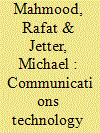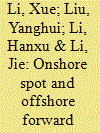|
|
|
Sort Order |
|
|
|
Items / Page
|
|
|
|
|
|
|
| Srl | Item |
| 1 |
ID:
173768


|
|
|
|
|
| Summary/Abstract |
By facilitating the flow of information in society, communications technology (CT; e.g., newspapers, radio, television, the Internet) can help terrorists to (i) spread their message, (ii) recruit followers, and (iii) coordinate among group members. However, CT also facilitates monitoring and arresting terrorists. This article formulates the hypothesis that a society’s level of CT is systematically related to terrorism. We introduce a simple theoretical framework, suggesting that terrorism first becomes more attractive with a rise in CT, but then decreases, following an inverted U shape. Accessing data for 199 countries from 1970 to 2014, we find evidence consistent with these predictions: terrorism peaks at intermediate ranges of CT and corresponding magnitudes are sizable. Our estimations control for a range of potentially confounding factors, as well as country fixed effects and year fixed effects. Results are robust to a battery of alternative specifications and placebo regressions. We find no evidence of a potential reporting bias explaining our findings.
|
|
|
|
|
|
|
|
|
|
|
|
|
|
|
|
| 2 |
ID:
167774


|
|
|
|
|
| Summary/Abstract |
The role of digital communication has been given a lot of credit and influence in its presumed power to bring about change in society, on a local or national or global level. When this presumed power for change or disruption is applied to the existing world order, there is a more nuanced outcome. In the current global order, the United States remains the unipolar hegemonic power. However, it is becoming visibly weakened, much of the harm coming from the results of its own foreign policy actions that are more guided by values and norms, rather than interest. Digital communication plays a role in both defending the current world order and challenging it. It is done in a way that renders the traditional restraints and constraints of geopolitics impotent by making space and time irrelevant, and by opening up the potential for creating global networks and relationships.
|
|
|
|
|
|
|
|
|
|
|
|
|
|
|
|
| 3 |
ID:
095862


|
|
|
| 4 |
ID:
182746


|
|
|
|
|
| Summary/Abstract |
This paper investigates the dynamic relationship between the onshore spot market and offshore forward market for Chinese currency around the period of China's “8.11” exchange rate regime reform, one of the most important market-oriented reforms implemented on August 11, 2015. We compare return and volatility spillover effects between the two markets before and after the “8.11” reform. The empirical evidence shows that a remarkable change has occurred in both the return and volatility spillovers. Before the reform, return and volatility spillovers exist from the offshore forward market to the onshore spot market. After the reform, however, we observe an obvious reverse in the direction and an increase in the strength of the return and volatility spillover effects. These findings suggest the existence of cross-market information flows, a change in the direction and a strengthening of the dynamic relationship after the reform. We argue that the “8.11” reform serves as a milestone reflecting long-term underlying forces that increase the relative importance of the onshore market.
|
|
|
|
|
|
|
|
|
|
|
|
|
|
|
|
|
|
|
|
|